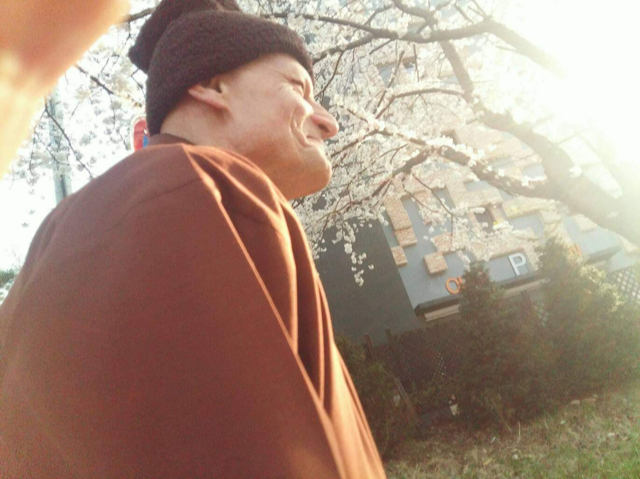
I met Jiyoung Sunim in South Korea. He was beginning the arduous training required to ordain as a Zen monk. As is the custom, he wore brown robes and stayed with the other initiates, who often did heavy work and faced the tough restrictions of all novices everywhere. He was by far the oldest of them, didn’t waste time with small talk or excess emotions. I liked him because he stayed out of everyone’s business, a reward of having already done, or failed at, everything. We understood each other.
We weren’t exactly friends, but I didn’t bother him, so he allowed me to enjoy moments with him here and there. That’s all I wanted anyway. He started having back pain and general health issues early in his training, which is common with this kind of discipline. We call it a “karma hindrance.”
Because he had trouble keeping the schedule of work and practice, the Zen master sent him to the city temple, where the conditions were more lax. I met him there during a covid lockdown. He’d developed a deep interest in bonsai, had grown more reserved, quiet—I hardly spoke to him for months at a time. With him, not a problem. He’d been seeing a chiropractor for more than a year, with limited results. He wasn’t able to sit for an entire round of meditation because of the pain. One day he came late to lunch, something weighing on him.
“Can someone go with me to the hospital? I need help with Korean translations.”
Nobody responded. I remember I was busy trying to finish something, and I’m not in any way good at Korean, but I wasn’t going to turn my back on him.
The local hospital took an X-ray and said he had a shadow on his lungs. They thought it could be tuberculosis or pneumonia, sent us to a bigger hospital for more tests. A CT scan gave a haunting glimpse inside his body. We saw only the trace of something ominous, something that required a special meeting with the doctor, who asked if he would return to his home country because he didn’t have much time left.
We didn’t know the extent of the cancer, or what it was. For that they sent us to the biggest hospital in Korea: Seoul University Hospital.
In Korea, a caretaker checks in with the patient and stays with them in the same room, sleeping beside them on a small cot, taking care of all the small things. I was there with him for nine days. It took that long to run all the tests. The results came back all at once, a flurry of bad news. It was cancer, different types at first, and hepatitis C. Eventually it all reduced to a single instance of prostate cancer that had metastasized all over his body. He had to get a nephrostomy catheter because a tumor was blocking his left kidney. He had tumors everywhere. The doctor pulled me aside. A high-contrast CT scan colors all the tumors black. As she scrubbed through the frames, his spine erupted in dark ooze—a back pain no chiropractor can cure. There were black spots everywhere, in every organ. Stage four prostate cancer is a beast.
He began chemotherapy, which didn’t bother him much, not at first. He had a great virility that seemed impenetrable.
His doctor was a remarkable man. He told us straight off that he couldnb’t cure him, but we didn’t catch on because he spoke so eloquently. He called it palliative care. He was a Buddhist. He came to visit us several times. Quite an unusual man. With him and many of the staff at the university hospital I felt a great kinship. The environment has many parallels to the Zen monastery. I loved going there.
Jiyoung Sunim began to have trouble sitting in a chair after the first round. He would hardly leave his room. He lost his appetite for temple food. I began shopping for him. He had me going to the Russian market at Dongdaemun, to five different grocery stores, to small shops he’d found on walks, from memory. I photographed more cans of beans, bags of pasta, potatoes, leeks… endless shots. He got to know what was where through the photos. It worked for months, until he crossed another threshold, lost the strength to cook for himself. I began looking for restaurants, occasionally bringing small items from the monastery kitchen. I’d text him from the buffet, send pictures of all the dishes. In the end he’d reduced to three soups and the morning juk. Then he stopped eating.
The cancer took him too quickly. He hardly had time to adjust to some new limitation before falling precipitously to another. He lost the ability to communicate a few weeks before he died. He’d come to completely rely on me. He trusted me. We understood each other. At the end he slipped into delirium and kept trying to leave the room, but he couldn’t stand on his own. I took him outside and let him cling to the balcony rail. It was cold. There was nowhere to go. I took him back inside and opened the window so he could hear the birds. It would be spring soon. It made him happy. Nature is the thing, maybe for all of us. That night I stayed with him because he couldn’t be left alone. I slept on the floor against the wall. At 10PM he sat bolt upright and slid off the bed, got down on the floor with me. Then he started kicking me. I left him alone. In the morning he was gone.
